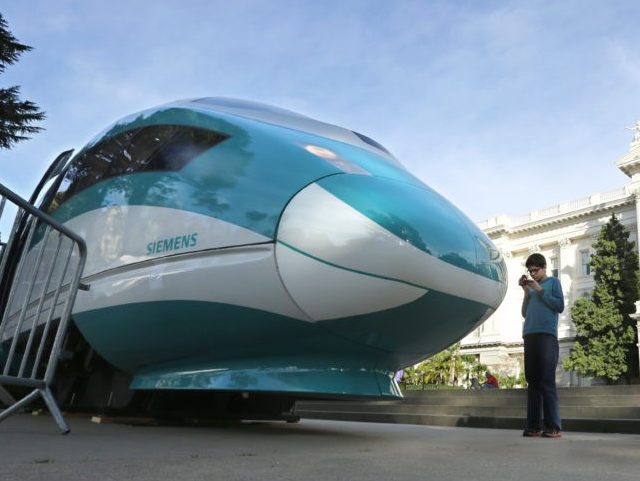The cost to build the first 119 miles of California’s high-speed rail project across flat ground in the Central Valley has spiked to $89.1 million per mile.
The latest revised budget jumped by 36 percent to $10.6 billion for the Fresno-to-Bakersfield link that was expected to be the cheapest one, since the tracks are being laid on rural farmland that is pancake-flat.
Civil and electrical engineering contractor Ernest Camacho, who joined the California High-Speed Rail Authority (HSRA) board a year ago, claimed that he had never been warned prior to the Jan. 16 meeting that the costs were about to spike.
He told the Fresno Bee, “We were just informed this morning.” Camacho angrily complained, “It’s horrifying when you look at the amount of money we’re going to have to reinvest to make this program work.”
HSRA chief program officer Roy Hill reportedly acknowledged at the board meeting, “The worst-case scenario has happened.” He broke down the additional costs as $725 million for property purchases, $325 million for construction delays, $450 million for “intrusion barriers” to separate bullet-train tracks from freight train tracks, and $600 million in additional payments to utility companies and local government.
The Proposition 1A bullet-train ballot measure was approved by a narrow 52.7 percent majority of voters in 2008. The voter guide stated that the cost for an 800-mile high-speed-rail system that would sprint from L.A.’s Union Station, cross the 4,160-foot Tejon Pass, roar up the Central Valley, and arrive at San Francisco’s Transbay Terminal at $37 billion.
With the trip estimated to take 2 hours and 40 minutes by traveling at an average speed of 220-miles per hour, it was estimated that 42 million Californians a year by 2020 would happily be ditching cars and planes in favor of a $57 high-tech bullet-train ticket by 2020.
Prior to the Jan. 16 board meeting, the cost estimate to build the train had spiraled upwards to $64 billion and the completion date had been pushed back to 2029.
Breitbart News noted in March that HSRA had supposedly saved another $28 billion cost overrun by agreeing to have its supposed bullet trains travel through Silicon Valley on a “blended” system that includes 60-year old Bay Area Rapid Transit (BART) rails, where commuter trains average speeds of 35 miles-per-hour.
While the cost of building the bullet train continues to escalate, the Priceline web site sends out “name your own price” blast e-mails each day that usually feature $59 tickets on five different airlines that fly from LAX to San Francisco Airport in an average of one hour and ten minutes.

COMMENTS
Please let us know if you're having issues with commenting.